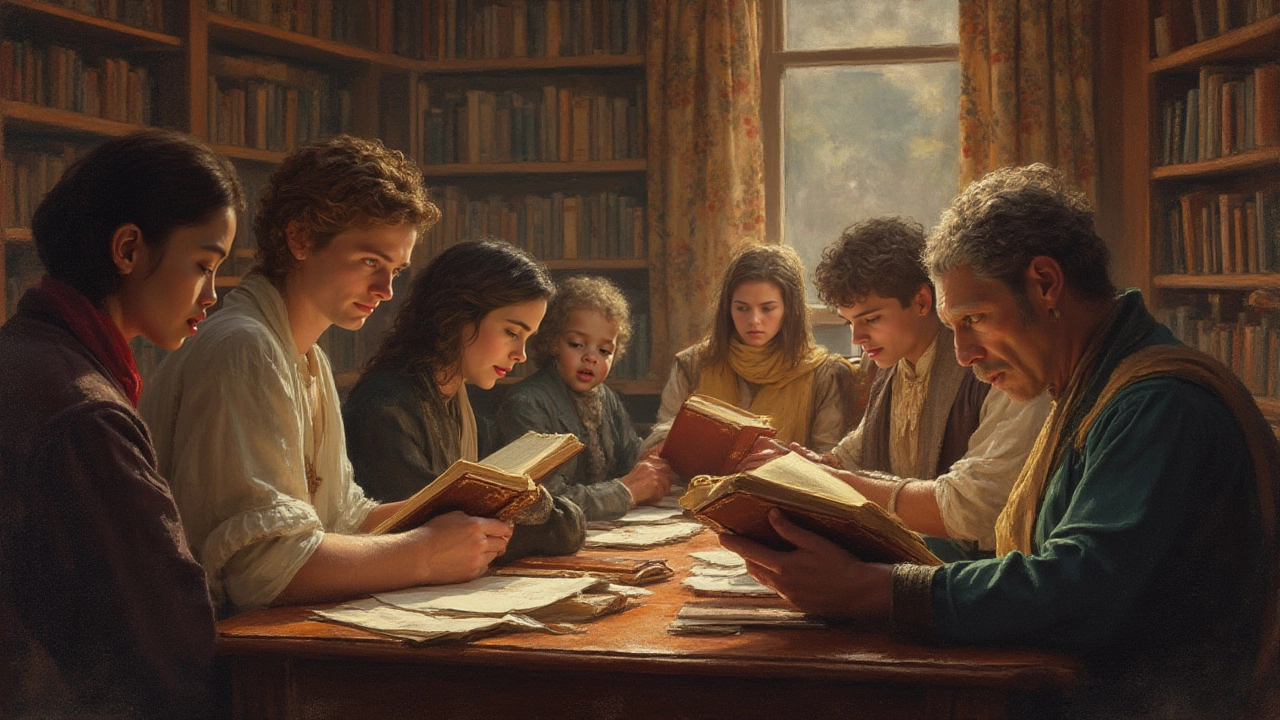Crack open the world’s list of books, and you’ll find something pretty wild: the title of the 1st most read book hasn’t budged in centuries. People keep chasing the latest trend, from Harry Potter to TikTok novels, but this ancient text leaves them all in the dust. No other book has been printed more, translated further, debated harder, or smuggled into more countries. Yes, we’re talking about the Bible. Whether you grew up reading it, studying it, or just hearing about it from your neighbor with the enthusiastic door-knocking habit, the Bible is everywhere—even as the world keeps changing at breakneck speed. But what is it about this book that keeps more than two billion people coming back, generation after generation?
How the Bible’s Reach Outpaces Every Book Ever Published
Let’s cut right to the numbers: the Bible has sold over 5 billion copies, dwarfing every novel, comic book, or series you can name. Guinness World Records still lists it as the king of bestsellers. That’s just the copies officially counted; it doesn’t scratch the surface of digital downloads, illicit prints, and neighborhood swap copies. If you pick a random bookshelf anywhere in the world—Tokyo, Lagos, Buenos Aires, a grandma’s attic in Ohio—odds are good a Bible is tucked in there somewhere.
Now, here’s what’s fascinating: it’s not just about the raw numbers, but the scale of reach. The Bible has been translated into over 3,400 languages and dialects. That includes not just written languages, but even Braille and sign language versions. In Papua New Guinea, some tribes received the Bible in their language for the first time only recently—imagine being the first person in your family to read a biblical parable in your own tongue. I once met a linguist who called these Bible translation teams “the rockstars of the publishing world”—glamorous, only in a very niche way!
The Bible’s spread is fueled by more than just churches. Think about hotel nightstands—ever wondered about the Gideons International folks who quietly slip Bibles next to your pillow? It’s been done over 2 billion times. Evangelists, missionaries, and sometimes just people desperate for hope have carried copies into regions other books simply don’t reach. During the Cold War, entire suitcases of Bibles got smuggled behind the Iron Curtain, right alongside forbidden novels and newsprint.
And with smartphones and the internet, the numbers get even more mind-boggling. Bible apps—like YouVersion—have logged over 500 million downloads on almost every continent. In countries where faith is censored, digital Bibles pass quietly from person to person. And if you think about all the times a verse pops up in a meme or comment section, its presence feels even bigger. It’s safe to say, no other text has such a footprint, both digital and physical, in modern and ancient times alike.
Why So Many People Keep Reading the Bible (Even If They Don’t Believe Every Word)
We usually think people read religious books to deepen their faith. That’s true, but for the Bible, there’s more to it. It’s as much a codebook for culture as a holy text. Ask three strangers why they’ve cracked one open, and you’ll get drastically different answers. Some look for spiritual comfort, others for historical context, and some for literary inspiration. There’s even a healthy chunk of folks who got forced to memorize verses for a Sunday school prize and barely remember what the reward was (for me, it was a rather disappointing bookmark).
The real magic is the Bible’s reputation as a storybook, advice column, poetry collection, and “greatest hits” of ancient wisdom rolled into one. Even if you’ve never set foot inside a church, you probably can quote a verse (“Do unto others…” ringing a bell?). Phrases and metaphors from the Bible sneak into regular conversation—think "the writing on the wall" or "good Samaritan." Shakespeare borrowed its imagery. So did Bob Dylan, Kendrick Lamar, and more NFL coaches than you’d expect.
Beyond day-to-day references, people turn to the Bible in tough times. Research from Pew and Gallup notes huge spikes in Bible sales and search queries during wars, natural disasters, and political scandal. Even my grandma, who considered herself “spiritual but not religious,” dusted off her Bible whenever life got messy, looking for solace or perspective. It’s like an all-purpose survival guide for the soul.
If you’re curious about the text itself, the structure helps—it isn’t a single, continuous story. It’s dozens of books—history, prophecy, poetry, letters—all jumbled together. You can open to almost any page and get something different: a war story, a lament, a parable, or advice for dealing with grumpy relatives. Some folks actually prefer to read it out of order, picking a passage at random and pondering what it means for their day. Kind of like fortune cookies, but with more dramatic flair.
Let’s not forget education and academia. For centuries, literacy campaigns began with the Bible. In Colonial America, it was the first big book most children learned to read and the standard text in schools. Today, its stories and symbolism pop up in art, law, and politics. Even students who describe themselves as atheist or agnostic often cite reading the Bible for class. There are university courses with names like “Bible as Literature” and “The Bible in Pop Culture”—they don’t ask you to believe, just to see how this book shaped everything from movies to Supreme Court arguments. Love it or not, it’s everywhere.

The Impact of the Bible on History, Culture, and Daily Life
Here’s where things get even crazier—the Bible isn’t just the most read book, it’s the most quoted, challenged, and, yes, even banned. Across history, rulers and revolutionaries have argued over its verses. Laws and movements—abolition, civil rights, women’s equality—have drawn arguments and inspiration from its pages. Abraham Lincoln mentioned it as “the best gift God has given to man,” and MLK’s speeches wove biblical language right into the calls for justice that shaped modern America.
The impact spills into art, music, and movies. Michelangelo sculpted a whole ceiling on stories from Genesis; filmmakers from Cecil B. DeMille to Ridley Scott try new spins on Moses and Exodus every decade. Some artists skew toward the rebellious or the cheeky—the Bible’s stories get adapted into comic books, animated children’s videos, and even musicals (think "Jesus Christ Superstar"). If you raise pets like I do—my dog Bella always listens in during late-night Bible podcasts, and my cat Whiskers flops dramatically on my lap whenever I reach for the Psalms—it’s fun to realize the Bible’s tales stretch from Sunday sermons to children’s cartoons playing in living rooms worldwide.
The influence isn’t all feel-good, though. The Bible has sparked fierce debate. Which translation is best? What does it actually say about big topics—love, money, war? People have fought, founded countries, and even launched new religions over disagreements on just a few words. In the last decade, hundreds of new denominations and theological communities have popped up, each emphasizing a different reading of the ancient text.
Even outside religious communities, debates continue—about inclusion, justice, and what to take literally. In 2024, groups in the U.S. and Europe campaigned against censorship of Bibles in schools and pushed for modern, inclusive translations. It’s not just preachers and priests getting involved; ordinary people jump into forums online, challenging interpretations or writing blog posts about how a particular proverb changed their mindset.
And then there’s the way the Bible shapes everyday habits. Prayer before meals, “Bless you” after a sneeze, wedding vows, charitable giving—they all have roots, direct or indirect, in biblical tradition. When people joke about “turning the other cheek” after a nasty work email, or call someone a "prodigal son" after a wild weekend, they’re borrowing ancient imagery. It's woven into language so tightly, you probably quote it without realizing.
Tips for Reading the Bible—Whether You’re a Rookie or a Seasoned Reader
If you’ve ever tried to start reading the Bible and lost steam somewhere in Leviticus (with its endless lists of don’ts), you’re not alone. The book’s length (over 700,000 words!), mix of ancient history, poetry, and prophecy confuses even lifelong readers. Here’s what actually helps people dive in and stick with it, no matter their background.
- Start with the approachable parts. The Gospels (Matthew, Mark, Luke, John) feel the most like stories—biographies bursting with parables, lessons, and drama. Psalms and Proverbs offer poetic takes and practical life tips. These sections are favorites for comfort reading or getting a daily nudge.
- Try a modern translation. Unless you’re a fan of Shakespearean English, go for clear and current versions like the New International Version (NIV), English Standard Version (ESV), or the New Living Translation (NLT). You’ll get the sense without the guesswork.
- Read with a guide. Apps like YouVersion, Bible Gateway, and Blue Letter Bible have reading plans, audio versions, and side-by-side notes. If you’re curious about context or tricky bits (like genealogies), check out their tools; they make ancient customs and debates less intimidating.
- Share with others. Book clubs, faith groups, or even online forums can add fun and perspective. I once joined a virtual reading challenge with friends from three countries—we swapped memes, debated tricky passages, and discovered cultural differences in understanding the same verse.
- Pace yourself. It’s a marathon, not a sprint. Some people read just a few verses a day, jotting down a question or personal reaction. Others go all in with yearly reading plans. There’s no “right” way—do what fits your curiosity and schedule.
- Don’t sweat the confusing parts. Even experts admit some passages are tricky or open to interpretation. When you hit something odd (“unclean animals,” ancient rituals), take a break and dig back in later—there are whole podcasts and blogs dedicated to wrestling with tough lines.
- Look for connections. Modern movies, art, and even music videos sneak in biblical stories and phrases. If you spot one, it can be fun to track where it comes from and how people reimagine old concepts in new ways.
The world keeps spinning out new books, viral hashtags, and wild ideas. But when it comes to sheer reach, the mystery and relevance of the Bible keep it at the top—connecting people across languages, generations, and breakfast tables. Whether you read it, quote it, debate it, or just wonder what the fuss is about, the Bible—yes, the most read book in the world—still belongs to everyone, in its own peculiar way.
